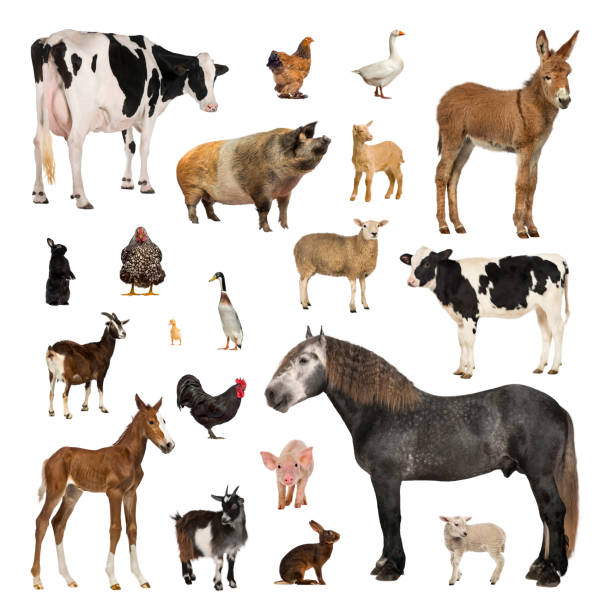
Navigating the Arizona Livestock Market: Rules for Buying and Selling Cattle, Horses, Goats, Sheep, and Swine
Welcome to the Ranch Blog on AZ-Livestock.com, your go-to source for all things related to the vibrant world of buying and selling livestock in the great state of Arizona. Whether you’re a seasoned rancher or a budding enthusiast, understanding the rules and regulations is crucial to thriving in the livestock market. In this article, we’ll explore the key guidelines for purchasing and selling cattle, horses, goats, sheep, and swine in Arizona. So, saddle up, put on your thinking hats, and let’s delve into the exciting realm of livestock transactions!
Branding and Ownership Transfers:
One of the pillars of livestock transactions in Arizona is branding and ownership verification. It’s essential to ensure that the animals you’re buying or selling have proper branding and that ownership transfers are documented appropriately. Brand inspections help prevent disputes and establish clear ownership. Before finalizing any transaction, ensure the brands and ownership papers are in order, as they are the hallmarks of a legitimate and smooth livestock exchange.
Sale Receipts: The Paper Trail of Trust:
When it comes to sealing the deal, a handshake won’t suffice in Arizona’s livestock market. The Sale Receipt Rule demands a written sale receipt that leaves no room for confusion. This receipt should include crucial details such as the buyer’s and seller’s information, a comprehensive description of the livestock being traded, and the agreed-upon price. By having a solid paper trail, you can avoid any disputes and ensure a mutually beneficial transaction.
Quarantine and Animal Health:
The wellbeing of livestock is paramount, and Arizona has stringent guidelines in place to safeguard animal health. When importing animals into the state, be prepared to adhere to quarantine requirements. These rules ensure that incoming livestock are healthy and won’t pose risks to local herds. Familiarize yourself with the specific quarantine regulations to ensure compliance and maintain the overall health and safety of your livestock and the broader agricultural community.
Transportation and Animal Welfare:
When transporting livestock within Arizona, it’s crucial to prioritize their welfare and adhere to transportation guidelines. Make sure your animals have adequate space, ventilation, and access to food and water during transit. Keep in mind the weather conditions and plan your journeys accordingly to minimize stress and discomfort for the livestock. By prioritizing animal welfare during transportation, you contribute to the overall health and productivity of your animals.
Cash is Still King:
In the world of livestock transactions, cash remains the preferred form of payment in Arizona. When buying or selling cattle, horses, goats, sheep, or swine, be prepared to conduct transactions in cash. This tradition reflects the longstanding customs of the ranching community and ensures a swift and secure exchange. So, keep those wallets full of greenbacks and leave the checks and credit cards for another occasion.
Conclusion:
Congratulations! You’ve lassoed the basics of buying and selling livestock in Arizona’s bustling marketplace. Understanding the rules and regulations surrounding cattle, horses, goats, sheep, and swine transactions is crucial for every livestock enthusiast. By adhering to branding and ownership verification, maintaining a paper trail of receipts, complying with quarantine guidelines, prioritizing animal welfare during transportation, and embracing the cash-driven nature of the market, you can navigate the Arizona livestock industry like a seasoned pro.
Remember, the rules may evolve over time, so it’s important to stay informed and consult official sources, such as the Arizona Revised Statutes (ARS) and the Arizona Administrative Code (AAC), for the most up-to-date information. Happy trading, ranchers, and may your livestock ventures in Arizona be filled with success, growth, and the joys of the open range!
What does the State Of Arizona consider Livestock:
In Arizona, livestock refers to a variety of animals raised for commercial purposes. The Arizona Department of Agriculture defines livestock as animals that are primarily used for food, fiber, or agricultural purposes. The following animals are generally considered livestock in Arizona:
- Cattle: This includes beef cattle and dairy cattle, which are raised for their meat, milk, or breeding purposes.
- Sheep: Sheep are raised for their meat (mutton), wool, and sometimes for breeding purposes.
- Goats: Goats can be raised for their meat (chevon), milk, fiber (mohair), or for clearing brush and vegetation in some cases.
- Swine: Pigs, also known as swine, are raised for their meat (pork) and can be found on many hog farms in the state.
- Poultry: Chickens, turkeys, ducks, and other birds raised for meat (poultry) or eggs (layers) are considered livestock.
- Horses: While horses can serve various purposes, including work, recreation, and racing, they are also considered livestock in Arizona.
- Bison: Bison, also known as American buffalo, are raised for their meat, hides, and in some cases, as a conservation effort.
- Other Animals: Other animals such as rabbits, llamas, alpacas, and even bees (for honey production) can also fall under the category of livestock in Arizona, depending on their primary use and intended commercial purpose.
It’s important to note that specific rules and regulations may vary based on the type of livestock, their intended use, and the specific agricultural practices involved. If you have any questions or need more detailed information about a particular type of livestock, it’s best to consult the Arizona Department of Agriculture or a local agricultural extension office.
Her is the link https://agriculture.az.gov/
